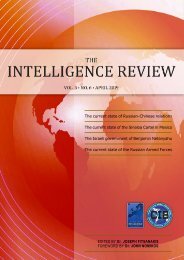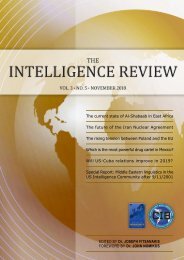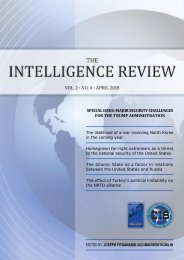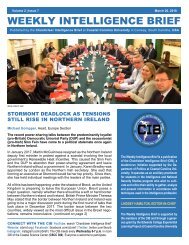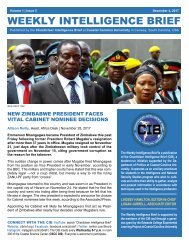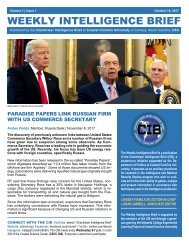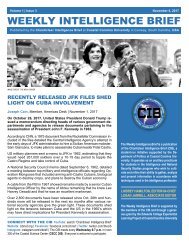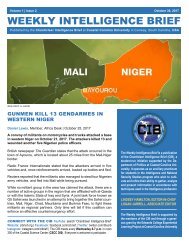The Intelligence Review | volume 5 | issue 9 |
This volume is the product of a transatlantic collaboration between the Chanticleer Intelligence Brief (CIB) and the European Intelligence Academy (EIA), a network of intelligence studies scholars, specialists and students, who are dedicated to promoting collaboration between Europe and the United States in intelligence scholarship and research. As always, the contents of this latest volume of The Intelligence Review are both timely and insightful. Joshua Altman focuses on the relationship between Scandinavia and the North Atlantic Treaty Organization alliance. Jacob Vaughan discusses the future of the presidency of Jair Bolsonaro in Brazil. Hannah Clegg examines the current state of relations between Israel and the Palestinians. Conrad Kodjanian analyzes the evolution and launch prospects of the Chinese digital Yuan. Jake Viator outlines the threats posed to regional stability by the Kata'ib Hezbollah militia in Iran. Ana Maria Lankford discusses the current state of relations between the White House and the United States Intelligence Community. And Jared Gott provides an update on French counter-terrorism efforts in Africa.
This volume is the product of a transatlantic collaboration between the Chanticleer Intelligence Brief (CIB) and the European Intelligence Academy (EIA), a network of intelligence studies scholars, specialists and students, who are dedicated to promoting collaboration between Europe and the United States in intelligence scholarship and research. As always, the contents of this latest volume of The Intelligence Review are both timely and insightful. Joshua Altman focuses on the relationship between Scandinavia and the North Atlantic Treaty Organization alliance. Jacob Vaughan discusses the future of the presidency of Jair Bolsonaro in Brazil. Hannah Clegg examines the current state of relations between Israel and the Palestinians. Conrad Kodjanian analyzes the evolution and launch prospects of the Chinese digital Yuan. Jake Viator outlines the threats posed to regional stability by the Kata'ib Hezbollah militia in Iran. Ana Maria Lankford discusses the current state of relations between the White House and the United States Intelligence Community. And Jared Gott provides an update on French counter-terrorism efforts in Africa.
- TAGS
- wwwcibrieforg
- intel
- yuan
- digital
Create successful ePaper yourself
Turn your PDF publications into a flip-book with our unique Google optimized e-Paper software.
Chinese competitors (Boadle 2020a). This competition raises
the importance of Brazil as an ally and makes the Brazilian
President an important actor in the ongoing power struggle
between the US and China.
Position of the United States
During the first half of his term, Bolsonaro was able to
strengthen Brazil-US relations, primarily due to his close
political alliance with then-President Donald Trump. This
relationship resulted in an increase in bilateral ties between the
two countries. These efforts include extending a tariff rate quota
that alleviates trade barriers on ethanol between Brazil and the
US (Costa 2020). Additional trade deals were signed at a virtual
summit for increased cooperation between the two countries
that focused on free trade for steel as well as efforts to decrease
dependence on the Chinese economy (Bodale 2020c).
Decreasing Chinese influence in Latin America was a top
foreign policy objective of the Trump administration, which
facilitated the increased cooperation between the two nations.
The tone of Brazil-US relations has greatly changed with the
new Joe Biden administration. On the campaign trail and during
the presidential debates, Biden condemned Bolsonaro’s Amazon
protection policies and implied there would be economic
sanctions for Brazil if environmental protection measures were
not enacted. Bolsonaro reacted angrily on social media and
referred to these comments as “a coward’s threat”. President
Biden has made it clear environmental protection is a top priority
of his administration and has continued to pressure Bolsonaro
to enact and enforce better protection policies for the Amazon.
The US and Brazil have been attempting to negotiate a deal to
combat climate change and more specifically decrease
deforestation (US Department of State 2021:1). However,
negotiations have been ongoing since April, and a deal does not
seem imminent, as there is a large disconnect between the
financial support Bolsonaro is asking for, and the accountability
measures he is willing to accept (Colman 2021). At the 2021 UN
27






